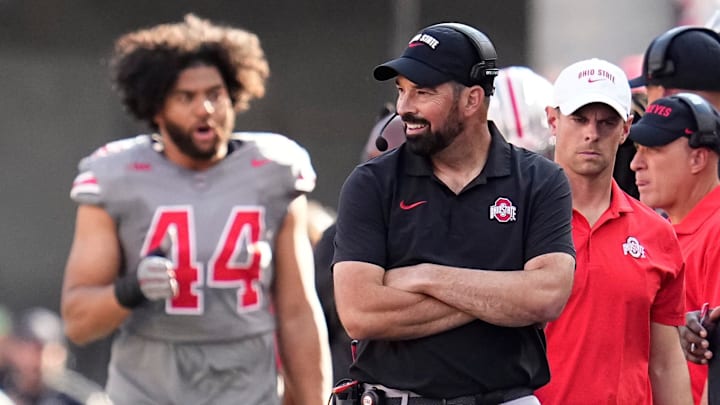Ohio State head coach Ryan Day addressed a growing topic in the Big Ten—whether traveling across multiple time zones presents a significant challenge to teams. With Ohio State's upcoming top matchup vs. the Oregon Ducks, long-distance travel has again become a hot-button issue among players, coaches, and analysts alike. However, Day was quick to downplay the concern when asked about the difficulties of making a cross-country trip.
When posed with a question regarding Big Ten teams' struggles this season in games that involved traveling across two time zones—specifically, that those teams are 1-8 this year—Day gave a straightforward answer. "Yeah, I don't really see it as much of a challenge that way," he responded, emphasizing that such trips don’t greatly differ from other long road games in the Big Ten. He went on to explain, "It's a 4-and-a-half-hour flight, it's a couple hours more than Nebraska, and we're going to stay on East Coast time.".
Day’s comments signal a practical approach, focusing on keeping the team’s routine consistent despite the change in geography. By keeping the team on their usual East Coast time schedule and structuring their preparation to fit their typical practice routine, Day feels confident his team will be unaffected by the distance. "We're going to stay on our time schedule... the time of the game and everything fits kind of how we practice," he added, further brushing off concerns about adjusting to different time zones.
The data might suggest otherwise, as the 1-8 record for teams traveling across two time zones this year has raised alarms for some. Yet, a deeper dive into these games reveals that many of the teams making these trips were underdogs to begin with, suggesting that their struggles may have more to do with the quality of the opposition rather than the travel itself.
Of the eight losses, only two teams were favorites and lost—both of which were USC under head coach Lincoln Riley. The majority of the matchups featured teams expected to lose, regardless of the travel involved.
Day's approach stands in contrast to some other coaches who have highlighted travel as a key concern, with varying strategies employed across the conference to minimize its impact. While some teams focus on adjusting to new time zones or breaking up the trip to acclimate, Day is sticking to a familiar routine, indicating confidence in Ohio State's ability to handle these long road trips without making them a focal point.
The Ohio State head coach’s confidence may reflect a belief in his team’s overall preparation and resilience. As he pointed out, "We're not going to look too much into it." By minimizing the distractions and potential disruptions of travel, Day seems to be sending a message that the Buckeyes are more focused on the game itself, rather than how far they have to go to play it.
Ultimately, while the discussion around travel and time zones will continue as the Big Ten expands, Ryan Day remains steadfast in his belief that it is not a major challenge for his team. His strategy of staying on East Coast time and not overemphasizing the travel aspect aligns with the broader notion that preparation and focus on the game plan is far more important than the distance traveled.
As the season progresses, it will be interesting to see if Day’s approach proves effective as the Buckeyes take on new challenges in their evolving conference landscape.
